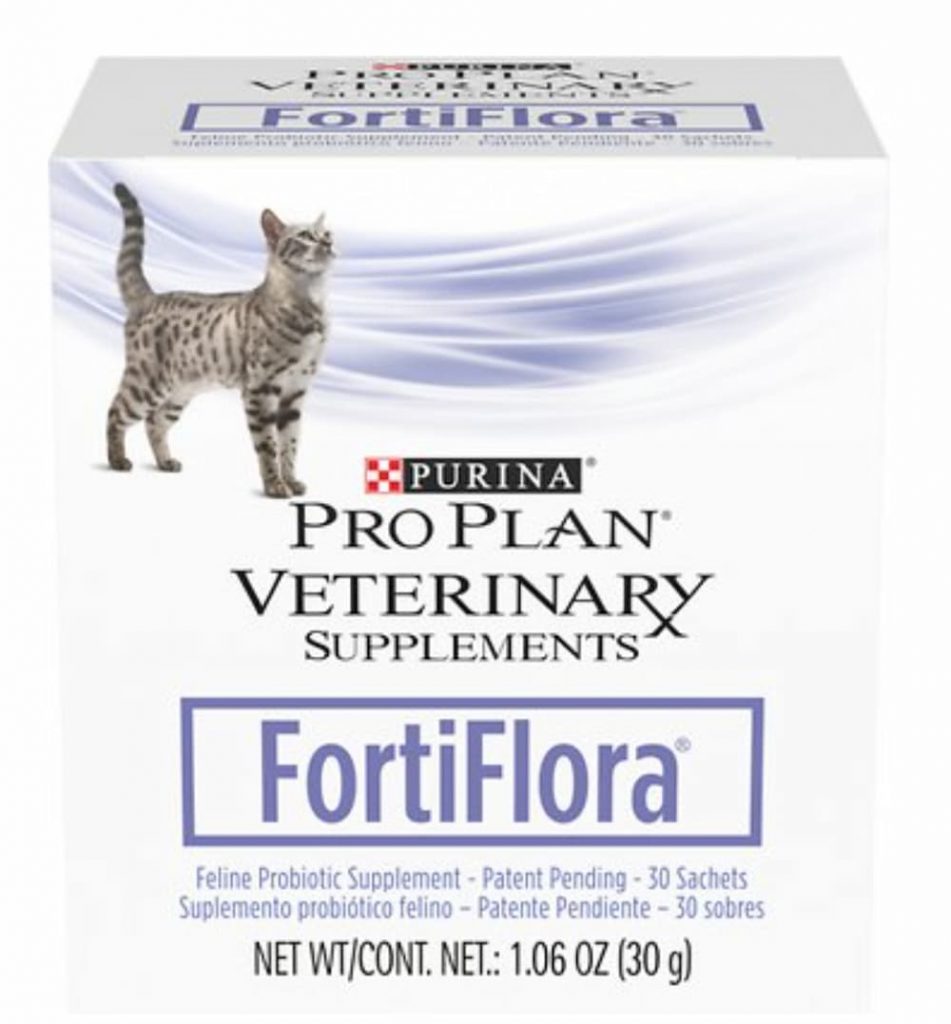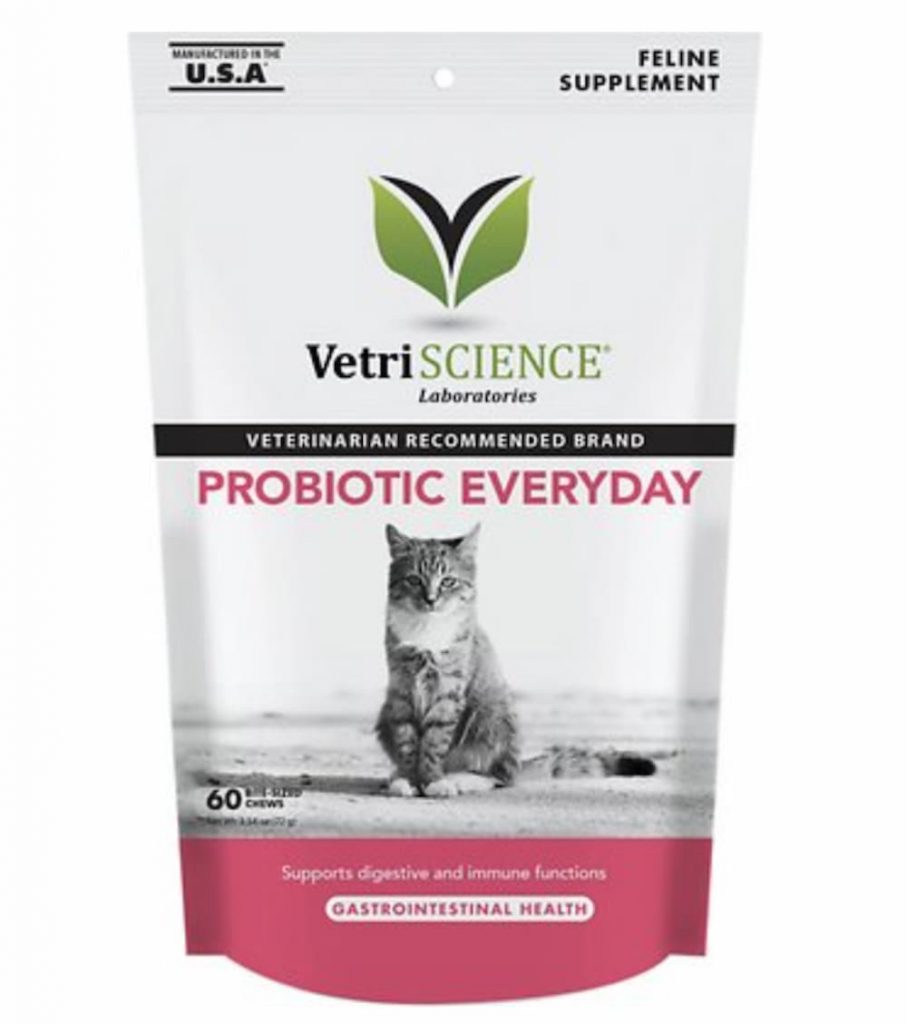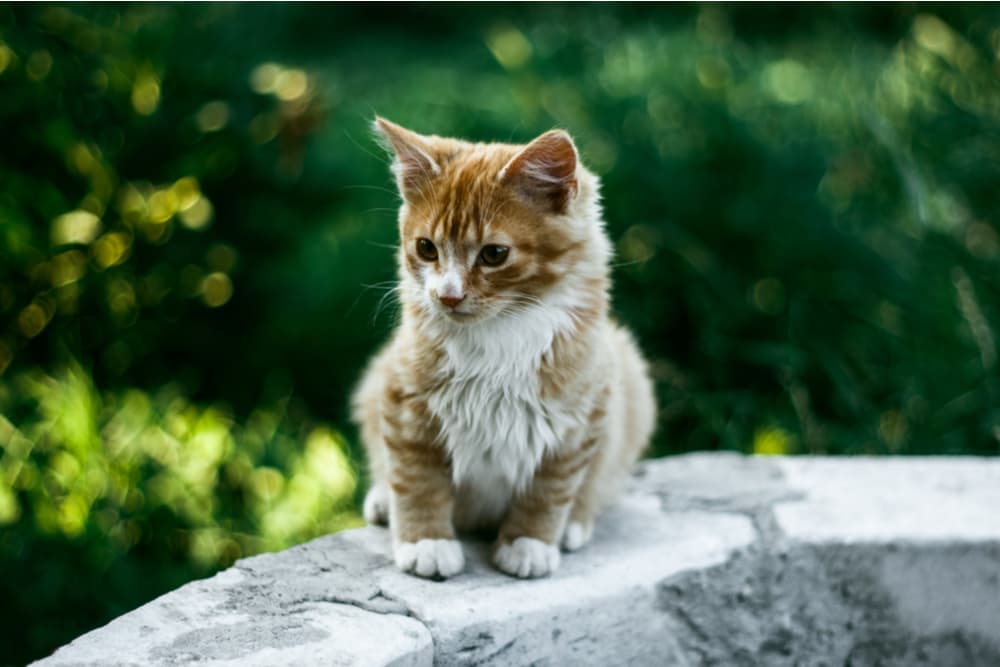Probiotics for Cats: 3 Great Options for Your Feline’s Gut

All featured products are chosen at the discretion of the GreatPetCare editorial team and do not reflect a direct endorsement by the author or reviewer.
Humans typically consume probiotics to improve digestion. If you’re not already familiar with the term, probiotics are basically “good” bacteria that support overall gut health. Common probiotic strains include Lactobacillus, which can be found in yogurt and other fermented foods, and Bifidobacterium, a yeast that can be found in dairy products. Probiotics can also be taken in supplement form to balance the gut. For cats, probiotics can act in a similar way and provide the same benefits as their human counterparts.
“An imbalance of unhealthy and healthy microbes in the intestines may contribute to weight problems, hormonal problems, overgrowth of bacteria or fungus anywhere in the body, mood issues, and low immunity, which is why supplementing with a high-quality probiotic may benefit your pet’s health,” says Dr. Sarah Wooten, a small animal veterinarian based in Colorado.
If you’re considering adding a probiotic to your cat’s routine, you’re not alone. Nearly 25 percent of respondents in a YouGov Analysis Institute survey said they turned to probiotics to support the well-being of their pets (1). In fact, the global pet probiotics market is expected to grow at a compound annual growth rate of 7 percent during 2021 to 2028, according to a DataM Intelligence report (2).
Your cat may benefit from a probiotic if they have:
- Diarrhea
- Stomach gurgling
- Bad gas
- Trouble keeping weight on
- Anxiety
Probiotics can also be used to restore good gut bacteria after a cat is on a round of antibiotics.
But Wooten warns, “Don’t give probiotics to any animals that are severely ill or have a compromised immune system.”
Our Probiotic Picks for Cats
- Best Overall Probiotic for Cats: Purina Pro Plan Veterinary Supplements FortiFlora
- Best Cat Probiotic with a Prebiotic: Nutramax Proviable Health Supplement for Cats and Dogs
- Best Cat Probiotic Disguised as a Treat: VetriScience Laboratories Probiotic Everyday for Cats
Best Probiotics for Cats: 3 Top Options
Best Overall Probiotic for Cats
Our pick: Purina Pro Plan Veterinary Supplements FortiFlora

Fortiflora from Purina is one of the most widely recommended pet probiotics by veterinarians. You can use this liver-flavored powder on both kittens and adult cats who suffer from diarrhea and other digestive issues. Simply mix the packet into your cat’s food and this probiotic will go to work promoting normal intestinal microflora.
Highlights
- Enterococcus faecium probiotic is meant to restore the microflora balance in the cat’s intestines for better bowel movements.
- Contains guaranteed amounts of live active cultures: 100 million CFUs (colony forming units) per gram
- Has nutritional additives, like proteins, vitamins, and minerals, to support overall health
- May help relieve stress, improve digestion, and strengthen immunity
- Comes in individual packets (30, 60, 90, or 180 count)
Things to Consider
- Many reviewers indicated that their cats seem to love the flavor and taste, but other reviewers weren’t as lucky. It truly will depend on your individual cat’s taste buds
- If your cat has a medical condition or is taking medication, check with your veterinarian first
- Store in a cool, dry place
Best Cat Probiotic with a Prebiotic
Our pick: Nutramax Proviable Health Supplement for Cats and Dogs

This multi-strain probiotic also contains prebiotics, which are complex carbs that feed the good bacteria in the gut. Intended to help with tummy troubles brought on by stress or a change in diet, this probiotic can improve loose stool, decreased appetite, or vomiting. It boasts billions of live beneficial microorganisms per capsule.
Highlights
- Contains seven strains of beneficial bacteria with 5 billion CFUs of microorganisms per capsule
- Also provides prebiotic support
- This product can be used for both cats and dogs
- Available in 30, 60, 80, or 160 count
Things to Consider
- Comes in capsule form, which a cat may easily spit out
- You can open the capsule and sprinkle the contents on food as a second option for administering. The powder inside is supposed to be flavorless/tasteless
- Store at room temperature and keep out of direct sunlight
Best Cat Probiotic Disguised as a Treat
Our pick: VetriScience Laboratories Probiotic Everyday for Cats

Packed with both prebiotics and probiotics, this bite-sized chew aims to support GI tract function and digestion in treat form. If your cat suffers from stomach issues or is/will be under stress, this product can help keep the issues at bay. And the best part is, this product is equipped with GanedenBC30, which is a patented strain of probiotic bacteria you can find in foods, drinks, and supplements.
Highlights
- Contains 100 million CFUs per chew
- The fact that it’s in treat form should excite your feline friend
- Made in the USA
- Veterinarian recommended
- 60 bite-sized chews per bag
Things to Consider
- Chews only seem to come in duck flavor, which may not appeal to all cats. Some pet parents had better success breaking them up and mixing them with food
- Store in a cool, dry place
Probiotics for Cats: Buyer’s Guide

How Can Probiotics Help Cats?
As mentioned earlier, probiotics can support a cat’s overall digestive health, but studies suggest they may also help (3):
- Improve constipation and diarrhea symptoms
- Shorten amount of time until diarrhea resolves
- Benefit cats with chronic kidney disease (though specific benefits are unknown)
- Reduce kidney stones
- Improve blood sugar regulation in diabetics
Types of Probiotics for Cats
There are different types of probiotics for cats, and it’s important to discern what they are to find the right one for your pet’s specific needs. Some cat probiotics are meant for overall good digestive health, while others are for helping problematic digestion. Probiotics that are anti-inflammatory may help minimize a variety of illnesses and diseases related to the GI tract when given daily.
Beyond the types of problems these probiotics solve for, cat probiotics also come in different forms, such as:
- A supplement powder to add to food
- A capsule to give directly to cats (or break open and sprinkle on food)
- A chew to give like a treat
- Probiotic cat food
What to Look for In Cat Probiotics

According to Wooten, there are many pet foods that contain probiotics and prebiotics, but it’s always important to look for guarantees in labels. “There should be an indication on the label about what species and strains are included so that you can look up any efficacy studies that are associated with those strains,” she says. “Don’t use products that are formulated for humans, because humans and pets have their own unique gut flora.”
Look for these parameters when picking the best probiotic for your cat:
Live cultures: When shopping for the right cat probiotic, consider ones that have living (not dead) bacteria. Some of these probiotics may need to be refrigerated because they have live cultures in them that need to maintain a proper temperature to avoid spoilage.
High number of CFUs: You should also factor in the number of colony-forming units (or bacteria) in your probiotics. The more bacteria, the better.
Multi-strain formulas: In addition to the number of bacteria in your probiotic, it’s important to note that since you won’t know exactly what type of bacteria your cat needs for optimal gut health, a probiotic that has multiple strains of bacteria can be beneficial. A variety of strains on the ingredient list is a good thing.
Taste and flavor: Because we all know cats can be fickle, you’ll want to pick a probiotic with a taste that your cat would actually like. After all, if it is not a flavor your pet will eat, what good is it? And, as with a cat’s diet, you should definitely stay away from ingredients that your cat is allergic or sensitive to.
Can Kittens Have Probiotics?

The short answer is, yes, kittens can have probiotics. In fact, kittens (as well as senior cats) can tend to get easily stressed out by certain situations, like when there’s major change in their lives. This can leave them vulnerable to stomach issues. A probiotic can help balance out that anxious cat. But, keep dosage in mind. You will obviously want to give kittens smaller amounts of a probiotic than an adult cat. By the same token, you’ll want to ease up how much you give a senior cat since they generally don’t eat as much. Read the probiotic labels or consult a vet to understand how much to give and how often.
Precautions When Giving Cats Probiotics
As with many things that we give our pets, probiotics won’t work their magic overnight. Plan for your cat to get accustomed to their probiotics after two to several weeks to see any results. Results will also largely depend on the problem you’re treating if one exists.
Some probiotics may also come with side effects, like gas or upset stomach. If your probiotic is making problems worse or creating new problems, definitely halt and reassess by talking to your vet.
Plus, this goes for all products that aim to solve a problem in your feline friend. Probiotics are not suitable for every cat issue you’re having. While probiotics offer many benefits, you should always consult with your veterinarian to assess your cat’s digestive issues and beyond to understand the best treatment possible. For instance, if your cat is being treated for other ailments, their GI tract may be compromised and probiotics may not help at all.




